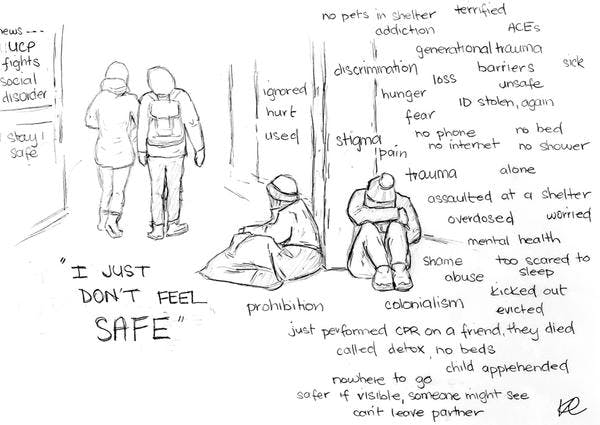Pencil drawing by Dr. Kate Colizza, whose patients include many unhoused people in Calgary.
Clearing the plains 2.0: Alberta drug policy is Indigenous genocide
"The research tells us what [Indigenous communities] already know. It's the multi-generational impacts of historical traumas, residential schools, and sexual abuse that brought these young people to addiction and to the streets. This doesn't ‘just happen.'" -Kukpi7 (Chief) Wayne Christian, The Cedar Project
The project of Canada has always been to secure land for resource extraction.
Land occupation explains “Clearing the Plains” — starvation through buffalo eradication.
It explains the 1876 Indian Act, reserve and pass system to corral Indigenous peoples.
It explains the 1884 Indian Act to criminalize them via selective alcohol prohibition.
Land occupation explains the 1884 launch of Indian Residential Schools at High River, Alberta, and it explains why Alberta, British Columbia, Manitoba, Saskatchewan and the territories housed by far the highest concentrations of these ‘schools.’
It explains the 1895 Indian Act banning ceremonies across the plains and northwest coast.
It explains the Sixties Scoop and ongoing family separation that unplug Indigenous people from their cultures.
Land occupation explains why colonial governments deflect liability for failing to regulate poisoned drug markets by emphasizing “addiction” as central cause of toxic drug deaths, instead of histories and policies placing select peoples at greatest harm.
It gives rise to an alternative explanation for governmental inaction: that land occupation in an ostensibly peaceful state requires policy tools that inflict disproportionate harms on Indigenous populations. By eroding options for people at risk of drug toxicity and choosing carceral instruments including mandatory treatment, the Alberta Government stands out by leaning into these harms.
Public conversations should locate the impacts of drug prohibition on settler populations within the recognition that, by accelerating drug toxicity harms disproportionately borne by Indigenous people, drug prohibition legislates Indigenous genocide.
